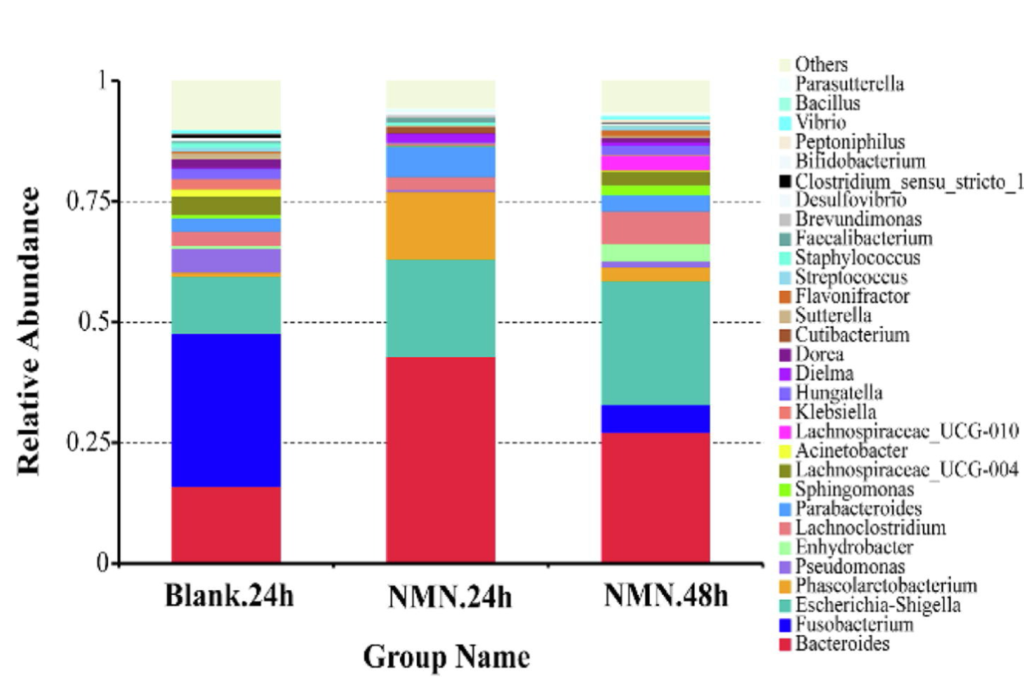Transforming Gut Health: New Study Shows NMN Fosters Beneficial Bacteria Growth
Using bionic intestines and human stool samples, scientists find that NMN increases the abundance of beneficial gut bacteria and their metabolites.
Highlights:
- NMN inhibits the growth of some gut bacteria while stimulating the growth of others.
- NMN increases the growth of beneficial gut bacteria called Bacteroides.
- A beneficial fat called propionate, which Bacteroides produce, is elevated by NMN.
Living within our gastrointestinal tract, often referred to as our “gut”, are hundreds of species of bacteria, forming a complex community. These bacteria affect everything from our immune system to our blood glucose levels. However, some are more beneficial to us than others.
Now, researchers from the Jiangsu Academy of Agricultural Sciences in China report in Food Research International that NMN promotes beneficial gut bacteria growth. Tang and colleagues show that NMN inhibits the growth of some species of gut bacteria while increasing the growth of others, including Bacteroides. NMN also elevates a fat called propionate, a beneficial metabolite produced by Bacteroides and other gut bacteria.
NMN Bolsters Beneficial Bacteria Growth
To study human gut bacteria, Tang and colleagues tested stool samples from 9 healthy volunteers (24- to 32-years-old). The samples were placed into a specialized machine that mimics human intestines, where 500 mg of NMN was added. The researchers then analyzed the DNA of the digested NMN-treated stool to identify different species of gut bacteria. They found that after 24 hours of fermentation in the simulated intestines, the species diversity was reduced by NMN treatment. These findings suggest that NMN inhibits the growth of some species of gut bacteria.

(Tang et al., 2023 | Food Research International) NMN Reduces Gut Bacteria Species Diversity. The total number of unique species (chao1) was reduced in human stool 24 hours after NMN treatment (NMN.24h) compared to human stool not treated with NMN (Blank.24h). The species diversity began to increase again after 48 hours (NMN.48h).
When looking at different genera of bacteria (genera or genus is a category in biology grouping similar species together), NMN was found to increase Bacteroides and other genera of bacteria that produce a beneficial fat called propionate after 24 hours. Moreover, harmful genera of bacteria were reduced in number when in the presence of NMN for 24 hours. These findings suggest that NMN promotes the growth of beneficial gut bacteria while hindering the growth of harmful gut bacteria.

(Tang et al., 2023 | Food Research International) NMN Promotes Growth of Beneficial Gut Bacteria. Beneficial gut bacteria like Bacteroides (red) and Phascolarctobacterium (orange) were increased, while harmful bacteria like Fusobacterium (blue) were reduced in human stool 24 hours after NMN treatment (NMN.24h) compared to human stool not treated with NMN (Blank.24h). The relative abundance of these bacteria began to change back to normal after 48 hours (NMN.48h).
When our gut bacteria feed on the carbohydrates we eat but do not digest and absorb ourselves (fiber), they produce fats called short-chain fatty acids (SCFAs). SCFAs help maintain normal gut function, promote digestion, heal injured intestinal tissue, and prevent ulcers and inflammation. Tang and colleagues found that NMN treatment increased the concentration of SCFAs, including propionate in the artificially digested human stool. These findings suggest that NMN increases beneficial SCFAs in the gut.

(Tang et al., 2023 | Food Research International) NMN Elevates the Beneficial Fat Propionate. Beneficial fat propionate is elevated in human stool 24 hours after NMN treatment (NMN) compared to human stool not treated with NMN (Blank). The concentration of propionate nearly returns to normal after 48 hours.
The Timing is a Bit Off
Overall, the findings of Tang and colleagues suggest that NMN inhibits the growth of harmful gut bacteria while promoting the growth of beneficial gut bacteria, including those that produce beneficial SCFAs. However, while the system used by Tang and colleagues mimics how NMN would affect gut bacteria growth in humans, the timing is a bit off.
Digestion only takes 6 to 8 hours in the human body, so it doesn’t seem likely that our bacteria will be exposed to NMN for a full 24 hours if taken orally. Additionally, it should be noted that NMN was nearly 100% intact after 6 hours in the bionic intestines. Because of this, NMN is probably absorbed through the intestinal wall and into the bloodstream upon oral intake, especially if taken on an empty stomach.
Still, it is possible that some of the effects shown in this study occur in humans upon oral NMN supplementation. However, the effects are likely less strong. Studies examining the gut bacteria of individuals (preferably older vs younger) after supplementation with NMN may verify this possibility.
Model: Bionic intestines
Dosage: 500 mg NMN

